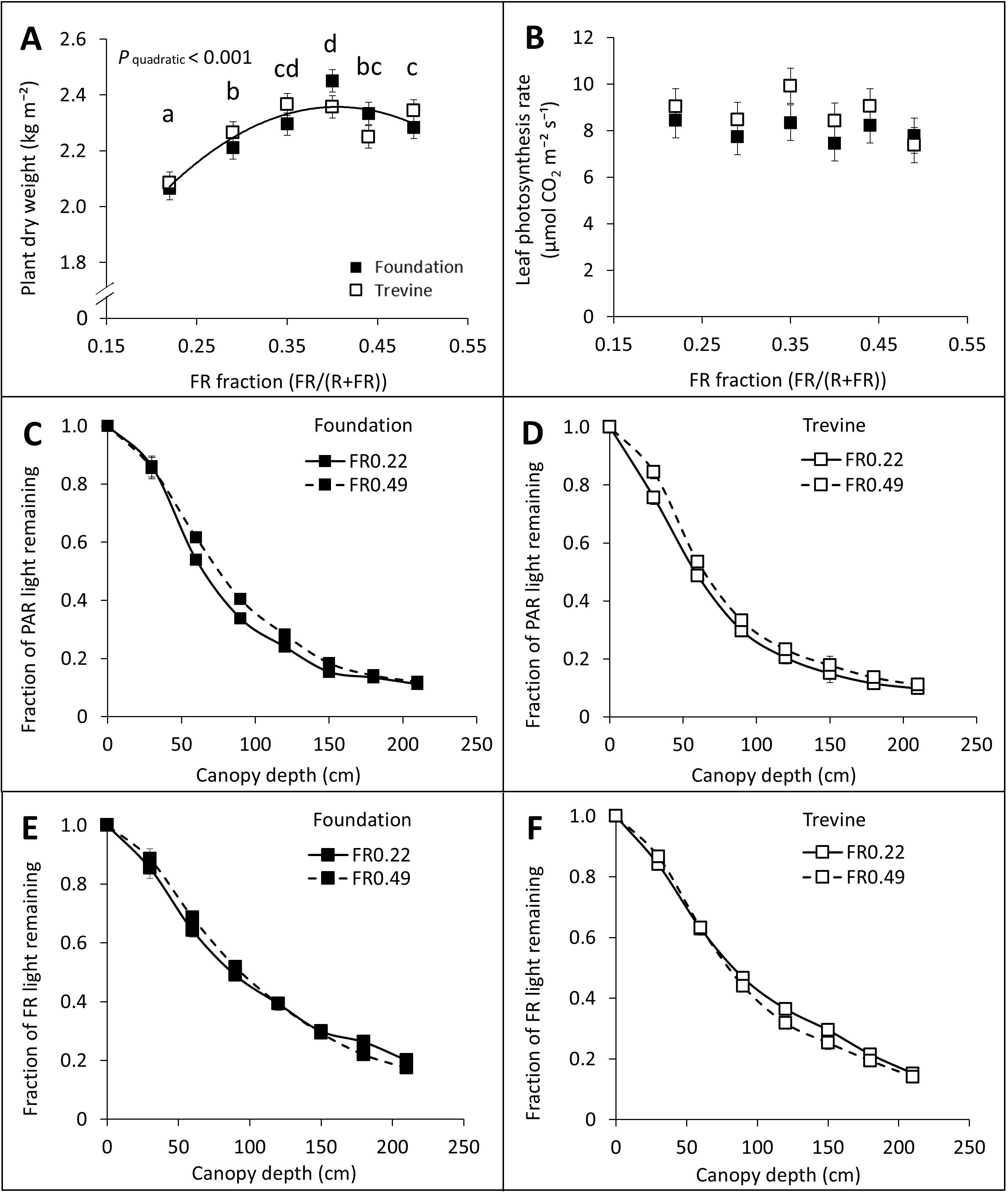- 1Horticulture and Product Physiology, Department of Plant Science, Wageningen University and Research, Wageningen, Netherlands
- 2Signify Netherlands B.V., Eindhoven, Netherlands
- 3BASF–Nunhems, Nunhem, Netherlands
A Correction on
Dose-response of tomato fruit yield to far-red fraction in supplementary lighting
By Vincenzi E, Moehn A, Katsadas E, Karbor S, de Beer E, Millenaar F, Marcelis LFM and Heuvelink E (2025). Front. Plant Sci. 16:1618171. doi: 10.3389/fpls.2025.1618171
In the published article, there was an error in Figure 3 as published. Figure 3B depicted the effects of FR fraction in supplementary light on the fraction of dry matter partitioned to fruits instead of leaf photosynthesis rate. The corrected Figure 3 and its caption appear below.

Figure 3. Effects of FR fraction in supplementary light on plant dry weight after 20 weeks of cultivation, 140–143 DAT (A), leaf photosynthesis rate measured between 128 and 134 DAT (B), fraction of PAR (C, D), and FR (E, F) light remaining at different canopy depths for cv. Foundation and cv. Trevine. A trendline is depicted to show a significant quadratic relationship between plant dry weight and FR fraction (p < 0.1, averaged over both cultivars), and letters denote significant differences between treatments, as determined by Fisher’s protected LSD test. Each data point represents the average of two experimental units ± SEM, where the value per experimental unit is the average of five (B) or six (A) plants or the average of two experimental units (C-F). FR, far-red light; DAT, days after transplant.
The original article has been updated.
Publisher’s note
All claims expressed in this article are solely those of the authors and do not necessarily represent those of their affiliated organizations, or those of the publisher, the editors and the reviewers. Any product that may be evaluated in this article, or claim that may be made by its manufacturer, is not guaranteed or endorsed by the publisher.
Keywords: tomato, far-red light, radiation use efficiency, electricity use efficiency, fruit quality, vertical light distribution, photosynthesis, yield component analysis
Citation: Vincenzi E, Moehn A, Katsadas E, Karbor S, de Beer E, Millenaar F, Marcelis LFM and Heuvelink E (2025) Correction: Dose-response of tomato fruit yield to far-red fraction in supplementary lighting. Front. Plant Sci. 16:1701163. doi: 10.3389/fpls.2025.1701163
Received: 08 September 2025; Accepted: 18 September 2025;
Published: 10 October 2025.
Edited and reviewed by:
Anna N Stepanova, North Carolina State University, United StatesCopyright © 2025 Vincenzi, Moehn, Katsadas, Karbor, de Beer, Millenaar, Marcelis and Heuvelink. This is an open-access article distributed under the terms of the Creative Commons Attribution License (CC BY). The use, distribution or reproduction in other forums is permitted, provided the original author(s) and the copyright owner(s) are credited and that the original publication in this journal is cited, in accordance with accepted academic practice. No use, distribution or reproduction is permitted which does not comply with these terms.
*Correspondence: Ep Heuvelink, ZXAuaGV1dmVsaW5rQHd1ci5ubA==
 Elena Vincenzi
Elena Vincenzi Aron Moehn1
Aron Moehn1 Emmanouil Katsadas
Emmanouil Katsadas Frank Millenaar
Frank Millenaar Leo F.M. Marcelis
Leo F.M. Marcelis Ep Heuvelink
Ep Heuvelink